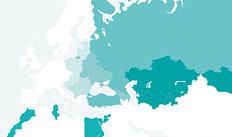Chapter 3
Conclusion
Recent proposals to unify bank supervision, harmonise resolution frameworks and transform the ESM into a fiscal safety net for banking systems in the eurozone should go a long way towards arresting the present crisis and addressing coordination failures between home- and host-country authorities within the single currency area. They remain incomplete, however, because resolution authority would remain at the national level for the foreseeable future, and because access to the ESM-based safety net would be limited to eurozone members. The latter implies that few EU members outside the eurozone are likely to exercise their option to join the single supervisory mechanism.
As a result, the proposals have raised concerns in several European countries, both inside and outside the eurozone and especially in emerging Europe. Some eurozone members worry about transferring virtually all supervisory powers to a central supervisor that may not be as concerned about local financial stability as national authorities. Some countries outside the eurozone worry that giving banks in the euro area the possibility of direct recapitalisation from ESM resources will tilt the competitive balance against banks headquartered outside. There is also a concern that national resolution authorities may not face the right incentives if fiscal losses are mutualised at the eurozone level. Furthermore, unifying supervision in the eurozone does little to address home-host coordination failures that affect countries outside the single supervisory mechanism or coordination failures in respect of bank resolution (which can be particularly severe).
Cross-border stability groups modelled on the Nordic-Baltic Stability Group would help to close some of these gaps. They could be set up for all European host countries of multinational banks (eurozone or not), and would include host-country authorities, resolution authorities (including Ministries of Finance of the home countries), the ECB, the EBA and any home-country supervisor outside the single supervisory structure. In addition, national authorities that join the single supervisory mechanism might retain the power to exercise certain macro-prudential instruments, such as additional capital buffers, to mitigate local credit booms. Lastly, an understanding on ex ante burden sharing should be reached that would require countries receiving ESM fiscal support to share banking-related fiscal losses up to a pre-determined level.
Non-eurozone countries should be allowed to opt into the ESM if they also opt into the single supervisory mechanism. In addition, it is worth considering pragmatic extensions of the banking union for European countries that either cannot or do not want to become full members. This could include an "associate member" status through which non-eurozone countries would benefit from ECB liquidity support but not from fiscal support, and defining a regime in which the ECB and host-country authorities would share responsibility for supervising both the subsidiaries and the parents of multinational groups operating in host countries in a pre-agreed way.







